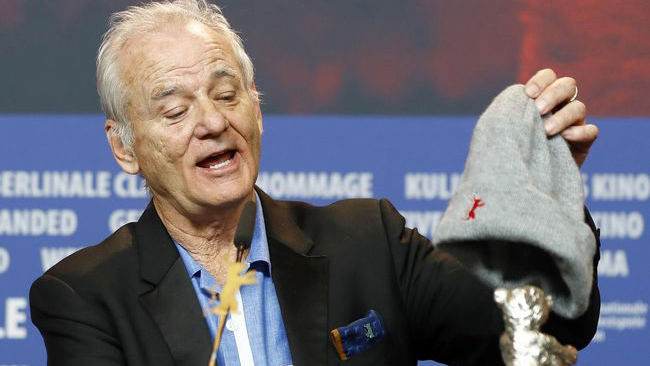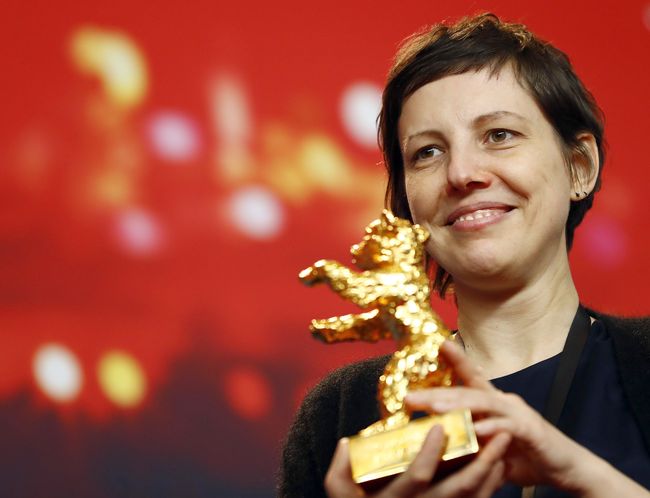A feast of inattention
The 68th Berlin Film Festival turned out to be the most controversial one in the past few years
The cinema is repeatedly compared with the dream; but there are different kinds of dreams. Some visions do not distract from reality, but, on the contrary, penetrate its surface, help to see the hidden matter, which is sometimes beautiful, and sometimes terrible. A bad film, meanwhile, alienates the viewer both from reality and from art. The Berlin Festival, with its scale, controversies, the eternal struggle of art and politics, aesthetics and ethics, functions as a feast of attentive look.
This year, it suffered a downturn without any apparent reason. There were some good films entered in the competition, a lot of middle-grade ones and failures, but there was no breakthrough, no true pinnacle equal to previous years’ entries including The Milk of Sorrow by Claudia Llosa (Peru), Taxi by Jafar Panahi (Iran), Fire at Sea by Gianfranco Rosi (Italy), and Spirited Away by Hayao Miyazaki (Japan). For the festival’s director of many years Dieter Kosslick, this Berlinale was the last; he announced his resignation as early as last year. Apparently, a spectacular farewell did not work out.
I will start with the biggest disappointment. Many hopes were pinned on the German director Philip Groening. He is known for two impeccably made works – documentary Into Great Silence and feature film The Police Officer’s Wife, as well as for spending a lot of time perfecting his films, so people expected him to do something awesome.
Groening’s My Brother’s Name Is Robert and He Is an Idiot shows 48 hours from the lives of a sister and a brother. The sister is preparing for an exam in philosophy, the brother helps her; between the studies, they sunbathe, bath, drink beer, do foolish things. The two quote from Augustine, Plato, Martin Heidegger, and muse on the nature of time. They also play complex games which they alone understand. These games gradually lead them to commit increasingly violent acts. Hostage-taking, robbery, incest, rape, murder – Groening exerts pressure on the viewer with a stream of affects, but these scenes are not grounded within the plot, do not follow from the logic of the characters’ development, are not supported by acting. All the horror could have happened, but it could have failed to just as well; the senseless cruelty echoes the senselessness of the story itself.

THE GOLDEN BEAR WAS AWARDED TO THE FILM TOUCH ME NOT BY THE ROMANIAN DIRECTOR ADINA PINTILIE (CO-PRODUCTION OF ROMANIA, GERMANY, THE CZECH REPUBLIC, BULGARIA, AND FRANCE)
Benoit Jacquot’s thriller Eva, starring Isabelle Huppert in the title role, serves as an antithesis of sorts to My Brother’s Name...; it is based on the namesake novel by the English detective fiction writer James Hadley Chase. This movie is also about a game, but it is not intellectual. The film’s antagonist is a man called Bertrand (Gaspard Ulliel), who steals a play after its author’s sudden demise, and becomes a successful playwright by posing as its creator. The publisher and the public demand that he write another play, so Bertrand finds the prostitute Eva (Huppert) and begins to feign a relationship with her, trying to get her fall in love with himself, and uses all the dialogs and situations as a material for work, thus acting as the copyist of the reality which he is directing. His game goes too far, with fatal consequences.
Eva is a well-made but utterly ordinary thriller, and the only lasting impression comes from the work done by Huppert, who leads her character throughout the range of states that the story requires: from indifference to rage, from humble passivity to dangerous aggression, from subjugation to domination. She is not afraid to appear in the film without makeup, with clear signs of her age, and remains charming despite it. The jury left Huppert without awards, but her acting immortality will not be affected by it.
Overall, Eva can be grouped with competition entries that left the viewers with no space for reflections, entertaining the audience with the simplest attractions: a dramatic plot or special effects. The participation of such pictures in the festival, which focuses on more profound cinema, is questionable, but perhaps not this time. The Silver Bear for Best Director went to a feature-length animated film by the American Wes Anderson, called Isle of Dogs. It shows Japan of the near future; mayor of the fictitious city of Megasaki is obsessed with hatred of dogs, which he, on the pretext of an epidemic of “canine flu” (also created by him), quarantines on a remote island turned into a huge landfill. The 12-year-old nephew of the mayor descends to this sad reservation after hijacking a plane to search for his dog, and thus causes a revolution.
The story is simple. Teens, scientists, and dogs are good guys, while officials and mafiosis are bad guys, who advocate the interests of cats in such a murderous way. The good guys win in the end, of course. People speak Japanese (sometimes without translation, but clearly) and English, while dogs speak English alone, and a quite refined variety of it to boot. It touches upon topics of environmental issues and corruption, as well as government conspiracy. In a word, it is a good(ish), topical(ish), simple(ish) work. Although it involves certain adult moments, in content it is an unpretentious little fairy tale for elementary and middle school-aged kids. One feels genuine respect for tremendous work embedded in dolls and decorations, and appreciates diligently executed details, up to fleas cruising in dogs’ hair. Unfortunately, the director’s effort did not match that of dollmakers and decorators. The motives of the jury remain a mystery.
A burningly dense plot drives the drama U – July 22, directed by 58-year-old Norwegian Erik Poppe, but the author’s intentions here are different from those reflected in thrillers or action films. July 22 tells the story that unfolded for an hour and a half on the island of Utoya on July 22, 2011, when the Nazi terrorist Anders Breivik shot dead dozens of children and teenagers there. The events are shown through the eyes of the 19-year-old Kaja (Andrea Berntzen), and the drama follows in full the principles of the unity of place and time. Poppe does not show violence directly, but rather creates an air of suspense through close and distant shots and shouts. The camera is moving fast from one hiding place to another, faithfully reflecting the chaos of the massacre, and stops for a short while to show those already dead. Moments of motion and relative calm alternate at the right rhythm. At the very beginning, Kaja turns to the camera: “You will never understand, so just listen,” and although this is only part of her phone call with her mother, the appeal is clear: it is not a reconstruction, but an attempt, as far as possible, to put the viewer in the victims’ position. Poppe succeeded in it: the film strikes the nerves like a well-honed razor, and ends with an astounding final. Unfortunately, July 22 received only an honorable mention from the Ecumenical Jury, although it deserved higher honors.
Actually, going back to the beginning of our conversation, it seems that the main competition jury of the festival, presided over by Tom Tykwer of Run Lola Run fame, found itself trapped between pretentiousness and “attractions.” While the latter got recognized through awarding a prize to Anderson, the former influenced the decision on the Golden Bear itself. The top prize, as well as the prize for the best debut, was awarded to the Romanian-German-French-Czech-Bulgarian co-production Touch Me Not, directed by Adina Pintilie. All the components of modern art house aesthetics are present there: the imitation of documentary cinema going as far as the author’s appearance in the film; a disabled actor suffering from spinal muscular atrophy; lots of erotica, generously seasoned with conversations (aimed to make it into meaningful erotica); actual conversations which are confessions by the director, long and poorly connected to the plot; various kinds of tactile interaction in sterile white interiors; positive attitude to every manifestation of corporeality. Almost all of these components are not bad by themselves, but having been brought together in this film, they make the impression of a well-thought-out exploitation production, as if the director knew what the modern festival cinema looked like, and constructed a kind of Golem. In the end, she did well enough for herself.
But there were better examples of combining relevance to modern issues with high quality. The psychological drama The Heiresses (Paraguay-Uruguay-Germany-Brazil, directed by Marcelo Martinessi), which won the Alfred Bauer Prize for opening new perspectives in the cinema, tells the story of an elderly lesbian, who, living in her father’s mansion which she has inherited, is gradually selling it out just as she experiences a personal crisis. It covers the subjects of LGBT issues, social justice, and erotica as well, but all these are done in an appropriate and accurate manner. The film is made using half-tones, without sharp turns, with skillfully muted acting. The action is so slow, the actresses (almost the whole story space is filled with female characters) are so restrained that sometimes it seems that nothing happens on the screen; nonetheless, it makes for an interesting viewing experience, and at the end, the director brings the plot to a decent final streak: the protagonist does break out of the soul-killing routine, after all. Ana Brun, who starred in the leading role, deservedly received the Silver Bear for Best Actress.
Such stories of downtrodden little people were the best part of the competition, and they got rewarded sometimes. For instance, Mug (Twarz) by Malgorzata Szumowska (Poland) received the Jury Grand Prix. Szumowska is a favorite child of the Berlinale: she won the Teddy Award from the LGBT jury for the film In the Name Of in 2013, followed by the Silver Bear for Best Director for the picture Body in 2015. This time, she brought to the event a story about Jacek, a handsome villager who has literally lost his face: it became deformed after he fell during the construction of a tallest-ever statue of Christ. His bride turns away from him, his mother believes him to be possessed by the devil, and children start teasing him in the street.
Szumowska adheres to liberal, secular beliefs, and her intentions are quickly becoming apparent, as she aims to ridicule dogmatic Catholic morality and small-town customs. She shows ordinary people in all the unattractiveness of their simplicity; the director does not spare clergymen either, like in the scene of confession in which the priest questions the young sinner about the details of her sin. And although it shows a lot of pain, Mug is still a funny movie. It is funny and angry.
Over 20 pictures entered the main competition; I have mentioned only the best or most characteristic ones. From a purely statistical point of view, the 68th Berlinale was not a failure: it sold 330,000 tickets, hosted accredited representatives from 130 countries, and stars were quite numerous on the red carpet. That is, we did see a feast. However, it was a feast of inattention, an ordinary dream that gets forgotten the next morning.
Still, the negative result is also a result. The Berlinale will reboot, draw conclusions, and make a splash with new energy. And it would be nice if Ukraine got represented there accordingly by that moment. Because this festival is really made for such film industries as ours, which, by and large, have nothing to lose.
Newspaper output №:
№15, (2018)Section
Culture





